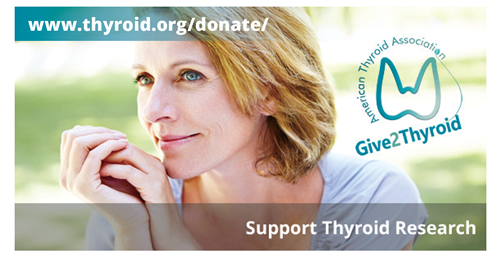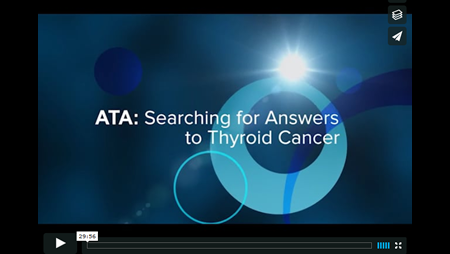Clinical Thyroidology for the Public summarizes selected research studies discussed in the previous month’s issue of Clinical Thyroidology, an official publication of the American Thyroid Association. Editor-in-chief, Alan Farwell, MD, FACE
Volume 12 Issue 11
Available in pdf format for saving and printing and Web page format for viewing online
PDF Format for Saving and Printing
Clinical Thyroidology for the Public Volume 12 Issue 11 (PDF file, 6.46 MB)
TABLE OF CONTENTS – Web Format
GRAVES’ DISEASE Early and effective control of Graves’ disease is associated with improved survival regardless of treatment method
Graves’ disease is the most common cause of hyperthyroidism in the United States. Some studies suggest that patients with Graves’ disease have an increased risk of death, mainly due to cardiac disease. The goal of the study was to look at the effect of treatment of Graves’ disease on heart disease and to understand whether the choice of therapy affects the survival in a large group of patients.
Okosieme OE et al 2019 Primary therapy of Graves’ disease and cardiovascular morbidity and mortality: a linked-record cohort study. Lancet Diabetes Endocrinol 7:278–287. PMID: 30827829.
(PDF File for saving and printing, 819 KB)
THYROID AND THE HEART High levels of some clotting factors may explain the association between high free T4 and cardiovascular disease
It is well known that changes in thyroid hormone levels affect heart rate, heart muscle contractions and heart rhythms. Previous studies have shown that high and high-normal thyroid hormone levels are independently associated with increased risk of heart disease and death in middle-aged and older adults. This study examined whether certain clotting factors play a role in the association of thyroid function with heart events and death.
Bano A et al 2019 Thyroid function and cardiovascular disease: the mediating role of coagulation factors. J Clin Endocrinol Metab 104:3203–3212. PMID: 30938758.
(PDF File for saving and printing, 285 KB)
HYPERTHYROIDISM Tocilizumab treatment for Graves’ eye disease
Graves’ eye disease is a condition that can cause symptoms ranging from mild eye irritation to severe eye bulging and double vision. High dose corticosteroids alone or in combination with radiation treatments can be used to treat moderate to severe Graves’ eye disease, but are associated with significant adverse health effects. In this study, the investigators researched whether a drug that interferes with the function of the inflammatory protein IL-6 would improve eye symptoms in patients with Graves’ eye disease.
Perez-Moreiras JV et al 2018 Efficacy of tocilizumab in patients with moderate-to-severe corticosteroid-resistant graves orbitopathy: a randomized clinical trial. Am J Ophthalmol 195:181–190. Epub 2018 Aug 4. PMID: 30081019.
(PDF File for saving and printing, 305 KB)
THYROID NODULES Hashimoto’s thyroiditis increases risk for thyroid cancer
Hashimoto’s thyroiditis is caused by antibodies that attack the thyroid gland causing inflammation which eventually destroys the gland. The possibility of an association between long term inflammation and cancer was first questioned in 1893. The aim of this study was to evaluate whether there is an association between Hashimoto’s thyroiditis and thyroid cancer in a large group of patients evaluated for thyroid nodules.
Silva de Morais N et al 2019 The impact of Hashimoto thyroiditis on thyroid nodule cytology and risk of thyroid Cancer. J Endocr Soc 3:791–800. PMID: 30963137
(PDF File for saving and printing, 307 KB)
THYROID CANCER Thyroid cancer survivors with good outcomes continue to worry after cancer diagnosis
Cancer survivors frequently worry about their future and this can impact their quality of life. Given the excellent outcomes for a majority of patients with thyroid cancer, it is sometimes thought that these patients do not have cancer-related worry. The goal of this study is to better understand cancer-related worry in thyroid cancer survivors with good outcomes.
Papaleontiou M et al Worry in thyroid cancer survivors with a favorable prognosis. Thyroid. Epub 2019 Jun 22. PMID: 31232194.
(PDF File for saving and printing, 407 KB)
THYROID CANCER Initial treatment of thyroid cancer with levothyroxine results in metabolic changes among women
Hypothyroidism causes changes in metabolism, resulting in a general slowing down of energy expenditure and metabolic rate. There is controversial information whether levothyroxine treatment returns metabolism to normal. This study was done in thyroid cancer patients before and after surgery to compare the metabolic rate in patients when they had normal thyroid function to when they were hypothyroid and on levothyroxine, as well as possible adverse side effects of levothyroxine-suppression therapy.
Izkhakov E et al 2019 Body composition, resting energy expenditure and metabolic changes in women diagnosed with differentiated thyroid carcinoma. Thyroid. Epub May 15. PMID: 31088334.
(PDF File for saving and printing, 594 KB)









